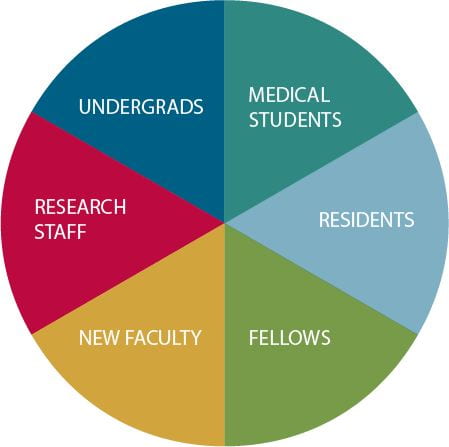The staff of the Clinical Outcomes Research office is committed to providing high quality training for future investigators. Trainees may expect to receive guidance and support through the entirety of the research process, from protocol development to manuscript writing and review.
One of the goals of the otolaryngology residency research experience is to ensure that all residents have basic training in how to conduct ethical clinical research. In addition, we expect that no resident will leave our program without understanding the complexity and challenges of clinical research.
Dr. Jay Piccirillo, Director and Founder of the Clinical Outcomes Research Office and Vice Chair for Research, Department of Otolaryngology-Head & Neck Surgery.
We want all residents to have a great learning experience so that the importance of asking a relevant clinical question, planning and executing a valid study to answer the question, and confidence to be able to communicate the results of the study to affect change in clinical practice will stay with them for their whole career.
Our students and trainees

Undergraduates
Undergraduates interested in a health professional career gain exposure to various aspects of clinical research, including protocol development, IRB submission, database creation and management using tools such as REDCap, preliminary data management and analysis, and report writing. In addition, undergraduates learn presentation and scientific communication skills.
Medical Students
For medical students, the staff of the Outcomes Office trains predoctoral researchers through the NIH-funded T32 and TL1 programs.
Residents
For residents, the staff of the Outcomes Office provides guidance and training during their six-month research rotation as well as training and assistance with the design and implementation of the resident’s research project for the entirety of their two-year NIH-funded T32 programs.
Fellows
For fellows, the staff of the Outcomes Office provides research design, data management, analysis, and results reporting for projects developed by the Fellow in conjunction with otolaryngology faculty.
New Faculty
For new faculty, the staff of the Outcomes Office assists with collection of pilot data for specialty society and federal grant mechanisms, assists with research career development, and provides data management, biostatistical, IRB, and project management resources to assist the new faculty member in their objective to conduct novel and innovative clinical or translational research as part of their career at Washington University.
Research Staff
The Clinical Outcomes Research Office is also responsible for the education and training of the Department of Otolaryngology’s research trainees.
How we assist
Our office assists investigators and trainees throughout the process of their research projects including:
- Protocol development
- Clinical and translational study design
- Grant development
- Federal regulations
- Comparative effectiveness/outcomes studies using large administrative, claims and clinical databases
- Database development and data management
- Planning for statistical analysis, sample size and statistical power
- Recruiting participants for studies
- Report writing, including progress reports and final reports
- Manuscript writing and review response